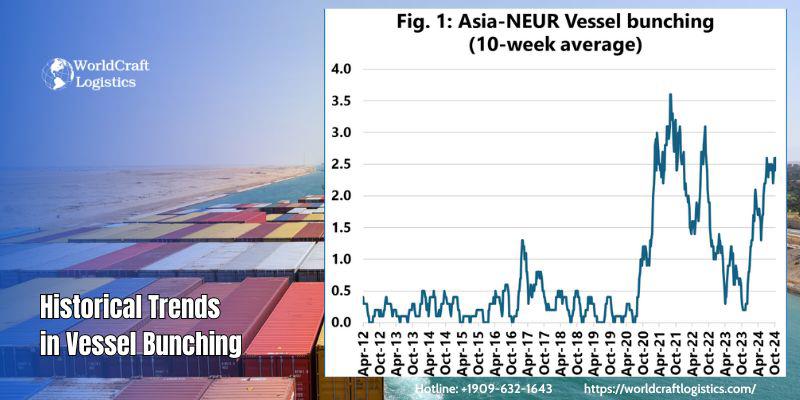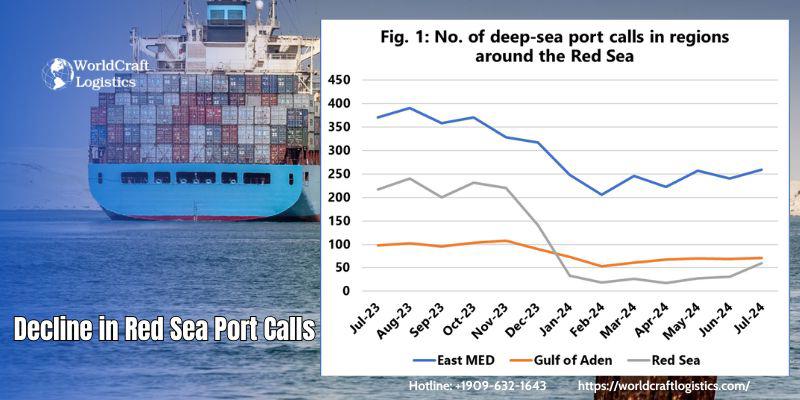
Starting June 1st, 2023 Our warehouse fee will be $0.65/cubic foot per month
In effort to lower the warehouse storage fee during inflation, we have went narrow aisle racking.This construction took us four months but the project is finally completed. With narrow aisle racking, we are able to drop storage by 24%.We as partners will go through this inflation together.
10/28/2024
Sea-Intelligence’s latest report highlights the rise in vessel bunching at ports globally, which has become a significant concern for the shipping industry. This escalation in vessel congestion, or "bunching," has intensified following the COVID-19 pandemic and has recently been compounded by the ongoing Red Sea crisis in 2024. The situation has led to substantial strain on ports and terminals, with widespread impacts across the Asia-North Europe route.
Vessel bunching refers to the occurrence of more sailings within a given week than the usual number of scheduled weekly services. This phenomenon creates a significant logistical challenge, as ports must handle irregular peaks in vessel arrivals. Sea-Intelligence has used a rolling 10-week period to estimate average levels of vessel bunching, identifying

Figure 1 from the Sea-Intelligence report highlights the Asia-North Europe route. The degree of vessel bunching was relatively low and steady during the eight years before the pandemic. However, as the COVID-19 pandemic began to affect global shipping, vessel bunching surged, reaching unprecedented levels. By the end of 2023, the situation had stabilized, with congestion rates almost returning to normal. However, the Red Sea crisis of 2024 reversed this trend, pushing vessel bunching levels near the pandemic peak once again.
The Red Sea crisis has caused profound disruptions in port operations, resulting in significant declines in port calls and widespread congestion. Sea-Intelligence notes that higher vessel bunching places added pressure on ports and terminals, leading to logistical bottlenecks that impact various modes of transport, including trucking, rail, and barge services.
While East Mediterranean (East MED) ports already experienced a reduction in deep-sea port calls, the month-on-month (MoM) drop in January 2024 reached 22%. The Gulf of Aden saw a comparable decline, with average monthly calls dropping by approximately 33%, from around 100 to 60-70 calls in 2024.

Jeddah and King Abdullah Port were among the most affected ports in the Red Sea. In January 2024, shipping lines ceased deep-sea services to King Abdullah Port, and Jeddah experienced a staggering 74% MoM decline in port calls, falling from December 2023 to January 2024. Though there was a slight rebound in calls by July 2024, Jeddah’s average monthly calls are still just 37 - significantly lower than the pre-crisis average of 135 calls per month.
Alan Murphy, CEO of Sea-Intelligence, explains the implications of vessel bunching on port operations:
"While the offered capacity may be the same over two weeks, i.e., no vessel sailing in one week followed by two vessels sailing the next week, having two vessels depart in one week and zero vessels in the second week results in an extraordinarily high workload in one week and none in the second week.”
This uneven flow causes a ripple effect, leading to potential port congestion and increased demand for auxiliary services, including truck, rail, and barge transport. Murphy highlights that vessel bunching serves as an indicator of pressure on port systems and the growing likelihood of congestion-related challenges. The report shows no current signs of relief from this intensified strain on ports.
The economic impact of these logistical disruptions has been profound. In September, the Russel Group reported that the economic losses caused by disruption along the Red Sea and Panama Canal, two of the world’s largest shipping routes, amount to an estimated $1.25 trillion. This staggering figure reflects the broad-reaching financial effects of these crises on global trade.
The Sea-Intelligence report underscores the challenges posed by vessel bunching on global shipping routes, with the Red Sea crisis in 2024 serving as a significant catalyst for renewed congestion. The sharp decline in port calls in critical regions and the substantial economic losses underscore the need for strategic measures to manage these disruptions. With ongoing congestion pressures, the report indicates that relief is unlikely soon, leaving ports, shipping companies, and supporting logistics infrastructures to grapple with these mounting operational and economic challenges.
*This article was compiled and edited by the Worldcraft Logistics team on the internet, closely following the original content. If you have any complaints or specific requests, please contact us for the earliest resolution.
SEO
Digital Marketing/SEO Specialist
Simon Mang is an SEO and Digital Marketing expert at Wordcraft Logistics. With many years of experience in the field of digital marketing, he has shaped and built strategies to effectively promote Wordcraft Logistics' online presence. With a deep understanding of the logistics industry, I have shared more than 500 specialized articles on many different topics.

Hot News
08/05/2024

Hot News
02/23/2023

Hot News
02/23/2023

Hot News
02/06/2023
Hot News
02/07/2023